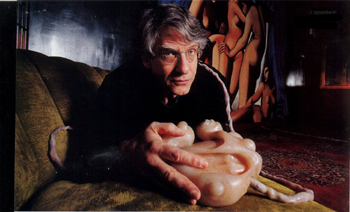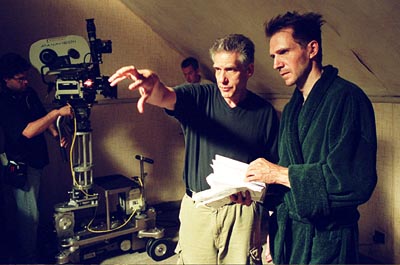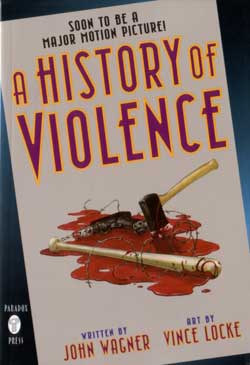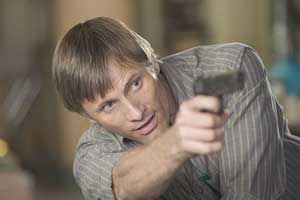 Most people, when they get into this business, have one holy grail — the person they’d most like to interview. For me, it was David Cronenberg. He’s a great director, one of the current masters, with a consistent yet evolving style and gripping thematic ideas. More important, he always seems genial and extremely articulate.
Most people, when they get into this business, have one holy grail — the person they’d most like to interview. For me, it was David Cronenberg. He’s a great director, one of the current masters, with a consistent yet evolving style and gripping thematic ideas. More important, he always seems genial and extremely articulate.
I missed the chance to talk to Cronenberg at the San Diego Comic Con this year, but New Line was kind enough to set up a phone interview with the director just a week later. When we spoke, I found him to be one of the best interview subjects I’ve encountered. Not only is the guy smart and friendly, he speaks with a refreshing candor.
New Line, of course, is the studio behind his new film, A History of Violence. (Read the Fetal Film Report!) Word so far has been very good, but since I hadn’t seen it yet, we kept the conversation a bit more general, going from approaches to storytelling and the idea of relevance to the expansion of DVD as part of the cinematic landscape.
(If you haven’t read Devin’s interview from Comic Con, it’s a good place to start, since my first question deals specifically with something that was said there.)
I was just reading a transcript of the roundtable you did at the San Diego Comic Con, and something in it struck me. There was a comment about A History Of Violence making David Cronenberg relevant again, and I’d love to know if that’s something that’s actually important to you.
It’s not really important. [Laughs] But I can tell you why not. I said that with — I don’t know how it came across in the transcript, but I said that with a lot of humor. Because the way you feel your life is and the way it’s perceived are two very different things. That goes for anybody, but in particular those who have a persona in the media. I took that comment that I read on the net to be funny. It might have been on Ain’t It Cool, the first reactions coming back from Cannes, where the movie was getting very good reviews but also was being considered to be potentially a commercial success as well, and the way that movies are reported now, it’s kind of like a sport! Who’s on top this week, you know? It’s like soccer scores or something weird. And then the Oscars are kind of like the championships. So if that is your mindset, then a movie like Spider is definitely out of the frame. And I guess whoever wrote that was excited that I might have a movie that a lot of people decided could be a commercial success as well as a critical one. I think that’s all it is, and I just thought it was funny. [Laughs) I don’t think that commercial success makes you relevant except in the realm of commercial success. That’s something in the movies, there’s no question about that, because you get more offers if you have a movie that makes money. And I’ve done that before, with The Fly and as far back as Scanners, so it’s not unknown to me. But to get back to the original question, I wouldn’t take that statement too seriously.
And that’s good to hear, because The Fantastic Four made $55 million, but does that make it more relevant than Spider?
It’s relevant to the guy who made it, I guess — he can say he had a hit movie. But yeah, that always raises the question of, well, relevant to what?
 Exactly. And of course, being relevant to some sort of actual human experience is a little more interesting…
Exactly. And of course, being relevant to some sort of actual human experience is a little more interesting…
Yeah, well, there’s a different thing. But I don’t believe that’s what the original comment I read meant. Because Spider, my god, you can’t say that that wasn’t relevant that way!
And talking about Spider, one thing that occurred to me the last time I watched it was that, more than most other directors, you seem to have a tremendous confidence in your audience — that they have an intuitive understanding of the images and don’t need an explicit breakdown of what’s going on. Given Spider‘s lack of financial success, do you ever feel like that confidence is misplaced?
Not really, no. it depends on what kind of movie you’re making. And I work very hard to put everything in the movie that’s necessary. So you make sure that the shots are there that you need, so that everything is actually there. But it depends on the style. Now, A History of Violence is quite different from Spider, although both are about identity in many ways, so they are connected. But each movie takes on its own persona, its own inner life, and you have to attend to that.
None of us ever expected Spider to make 200 million dollars. [Laughs] Now, if Spider had cost 100 million then our approach would have to be different. But if you’re making an art film with a capitol ‘A’ like Spider, then you know who your audience is, and it did have an audience. In fact, I just heard today that we’re getting our first deferral checks, so this is an opportune discussion — you’re the first to hear that. So it’s officially made money now. And now I can’t bitch and complain that it didn’t make a cent!
So in other words, you have to know what story you’re telling, and what the audience is for it, up to a point. You get a feel for it. But there’s no point in trying to make Crash be like A History of Violence; they’re completely different. But I do want the discourse of the movie to be on a pretty sophisticated level. Because if you start at a much lower level, you don’t get to go very far above that. Especially since I don’t make three hour movies. If you have to start by explaining everything and laying it all out, you’re not going to get very far away from that by the end. That really limits what you can say, and it limits the entertainment value for me, in terms of making it. You get bored if it’s too simplistic.
So while I can say that History is based on a simple structure, not simplistic, those are two different words, and it’s still got resonance and complexity. But it is more accessible, I think, to a mainstream audience, for various reasons. And those have to do not with how I’m telling the story, but what it is. This is a story about a more mainstream group of characters. But once again, I don’t fill in all the blanks for everybody. But because the characters are more familiar than the odd characters in my other films, they are less foreign to people than the characters of Spider or Crash, or Naked Lunch for that matter. So just on it’s own, it’s more familiar and so more accessible. And maybe that’s what the guy meant when he said ‘more relevant’.
 One thing that’s been pretty consistent in your films, especially in the past decade, is that they really bloom under a second viewing. Is that something that we’ll see in History?
One thing that’s been pretty consistent in your films, especially in the past decade, is that they really bloom under a second viewing. Is that something that we’ll see in History?
Yes, definitely. It will become a different movie the second time you see it. Obviously, for some specific narrative reasons, and then I hope in terms of …history is so simple that it’s almost transparent. And then when you see through it, there’s all kind of complexity inside. And that was my intention. I wanted it to be almost austere. And in a way, it’s like Spider in that sense, too. But because it’s an American story as opposed to an English one, and it’s not a period piece and it does begin with a family that will be familiar to viewers, there’s a sort of a deceptive simplicity involved. But it does get complex.
And that family…this isn’t meant to be a stupid question, but it will probably come out that way, so I apologize in advance. That family, and the mob characters in the movie, are things familiar to most people, but at first glance don’t seem to be things that are familiar to you. Did that have any bearing on the making of the film, or is it totally irrelevant?
No, it’s not irrelevant…it’s kind of interesting, actually. You get bored with yourself and so for me, to play with characters that are the staple characters of, even some sitcoms, was very novel! [Laughs] Characters like the ones in Crash are much more familiar to me, where they might be alien and incomprehensible to other directors. For me, they’re business as usual. I kinda turn it all inside out.
There’s even a scene in History which in my head is kind of like a sitcom scene, even though I doubt at that point in the movie anyone else would be thinking that. You know, there’s a living room, and a couch and a chair [laughs] and they sit there, and then get up and walk around and it could be some bizarre sitcom. It’s certainly not lit like one, but yeah, for me this is exciting and novel! So for me it’s very relevant, but not in the way one might think. I just thought it was a challenge for me to play with these characters and see what depths in them I could expose and explore.
 Is it a recharge to do that?
Is it a recharge to do that?
Oh, yeah! I mean, the movie was a pleasure to make. Much of that was because of the cast, and shooting at home in Toronto. The closest it comes in my work, I suppose, is The Dead Zone. There’s even a sheriff in both movies, and they’re the only two that are specifically set in the US, even though both were shot in Ontario. And there’s family stuff in each of them. The tone is as close as anything.
And thinking about doing this as a studio picture, but trying to create a tone that’s austere and complex, does the possibility of a popular DVD release make it easier to negotiate certain things? Does it change the equation at all?
No…we didn’t really talk about that at all when we were negotiating. It was a pretty simple meeting, really. They were really excited that I was interested; we just needed to make sure we were talking about the same movie. We revisited the fact that I would be collaborative, which I always am, anyway. And the first thing was, what do you want to do with the script, because everyone knew it wasn’t there yet; it was a first draft. DVD stuff wasn’t really considered. I mean it was in there; this is a $32m movie, and for me that’s expensive, it’s the most expensive movie I’ve ever made. So the understanding is that.,..and they were never this perverse, but I think they needed to be reassured that I wasn’t going to turn it into Spider.
But I can tell you that I’m going to have a couple of deleted scenes on the DVD, which is something that I’ve never done before, and certainly not with a first release. I think my attitude is changing. There are a couple of scenes that I took out, but that I quite liked on their own. So we finished them — that’s one thing that always drove me crazy about deleted scenes, is that they don’t get music or a proper sound mix or color timing. But that didn’t have anything to do with negotiations, it just developed afterward.
Is there any reason that you can pinpoint that has changed your attitude towards adding scenes like that?
Yeah, and in fact there’s a release of The Fly that’s going to have the famous catmonkey scene that no one has ever seen. I guess it’s just accepting that the audience for a DVD is a different audience. I still feel that if a scene is really not good, it shouldn’t be there. Actors are very vulnerable, and it wouldn’t be fair to show a scene where the actor wasn’t for whatever reason — possibly because of my directing — not giving their best. So I wouldn’t want to show a deleted scene that was wretchedly awful. [Laughs] That’s unfair to everybody. My initial reasoning is that any given scene is deleted because I don’t want it in the movie.
It would be different if it was a scene that was censored, or the studio was interfering and you finally got a chance to show your cut. But I’ve never been in that latter situation; I have had some scenes censored, but that’s a whole other thing. So the scenes are usually deleted because I didn’t like them. In this case, I did like them, but thought they were in the wrong movie, or weren’t right for the rhythm, and thought it would be interesting for the fans who are interested to take a look. That was kind of exciting for me. And the producers in charge of the DVD were prepared to pay for the finishing costs, so that didn’t come out of the budget of the movie.
That’s something most people don’t think about — I don’t want to spend money finishing a deleted scene when I can spend it on something that’s in the movie! Here, we were actually slightly under budget, but they were willing to finance it anyway. It’s worth it just for the sake of DVD sales to spend that money, and that’s a change as well.
Speaking of DVD, do you have any idea why we haven’t yet seen M Butterfly on disc?
No. Probably because nobody thinks it would make money. But sometimes it’s just inaction or disorganization. I would love to have it out there.
It’s really a shame that it’s missing, because as modern directors go, you’re one of the best-represented on disc. Almost all your movies are out there, and most with commentaries, which I think people really appreciate.
Oh, well that’s good to hear. Thanks. I don’t enjoy doing the commentaries so much, especially the old films, because you’re revisiting…well, I guess I kind of enjoy them once I’m into it, but I tend not to look at my old movies, so this forces me to, which can be hard. On the other hand, when I do it, I take it seriously and try not to be flippant.
 You mentioned that A History of Violence came in under budget. Does your long-standing relationship with Peter Suschitzky, Carol Spier and others help achieve that?
You mentioned that A History of Violence came in under budget. Does your long-standing relationship with Peter Suschitzky, Carol Spier and others help achieve that?
Well, it’s two wonderful things. One is incredible efficiency. We know each other so well, so we don’t have to go the personality interlocking, which can take a long time. And at the same time, we still challenge each other. It never gets boring. And they go away and work on other movies and have horrible experiences, and then come back and are really happy to work with me. [Laughs] It’s the family finally getting back together, and the energy level and the joy level is very high. So you get the combination of incredible efficiency with creative excitement. For a producer, that’s gotta be good. And you know, when I was thinking about doing Basic Instinct 2, they didn’t want me to bring any of these people.
Really? How strange!
Yeah. The rationale was that it was so I could have a new, fresh exciting challenge, blah blah blah, but really it was all about power. They didn’t want the crew to be my crew. And I’m happy to say that I got the opposite reaction from New Line. It was, and of course you will bring Peter and Carol! Which to me, if I was a producer, is what I would want, if just for the stability and continuity. It’s an ideal bunch of relationships and we’re all very excited when we get together. We don’t take it for granted; we’re all getting older, you know, so it’s always a very special event.
Now, I’ve read various things about Painkillers and London Fields. Are either of those current possibilities?
Painkillers is not going to happen. I can’t get into my own script anymore, which is a weird thing that happens. But London Fields is a possibility. I’m kind of juggling a few things, and I don’t know what’s going to happen next, which is kind of an exciting time. It’s the Cronenberg Uncertainty Principle. (laughs). I enjoy it.
I was talking to Samuel Hadida and Don Carmody the other day about Silent Hill, and Don was talking about you as exec producer of the werewolf flick Skinwalkers. Is there anything you can tell me about that?
No. [Laughs] At the moment, not really. Jim Isaac is just hassling out all the hassles, and I’m just trying to help as much as I can. But my help will come to be most valuable when the production starts to happen.